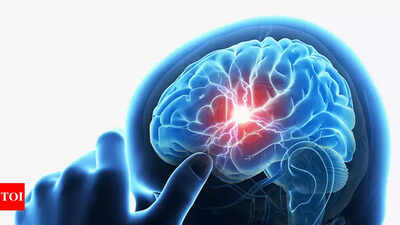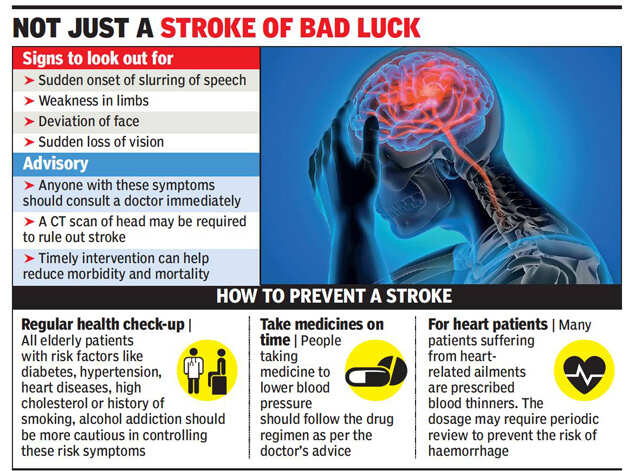Top Searches
- News
- City News
- delhi News
- Delhi: Stroke cases on rise, doctors advise caution
Delhi: Stroke cases on rise, doctors advise caution

Stroke is a leading cause of death and severe, long-term disability.
NEW DELHI: The fear of contracting Covid-19 forced many people, including those suffering from diabetes and hypertension, to stay away from hospitals at the peak of the pandemic. Now, many of them have developed complications and are in need of emergency treatment. Stroke is one of the complications.
According to Dr Asha Bakshi, senior consultant neurosurgeon at Moolchand Medcity hospital, 10-15 patients were admitted to their hospital for stroke in the last one month. “We do not know the exact reason behind the increase in cases. Some of them could be related to post-Covid complications. But it is also possible that many people, who were known to be at risk for stroke, developed complications due to discontinuation of periodic health check-ups during the pandemic,” she said.

Stroke is a leading cause of death and severe, long-term disability. It happens when blood supply to a part of the brain is cut off, either due to blockage in blood supply to the brain (ischaemic stroke) or leakage of blood from a burst vessel in the brain (haemorrhagic stroke).
Dr Bakshi said high blood pressure could be the trigger in both types of stroke. “Anyone with a history of hypertension or high blood pressure should check the blood pressure levels regularly. If the levels are high, it is important to consult the treating physician to recalibrate the drug dosage for better management of the condition,” she added.
Diabetics are also at high risk to suffer from stroke.
Dr Anoop Misra, chairman of Fortis C-Doc, said that there was acceleration and exacerbation of all risk factors for brain vascular events, including hypertension, diabetes and high cholesterol. “This must be tackled urgently with a good diet, exercise and decrease in salt intake,” he added.
“Smoking and alcohol intake have also increased because of the loneliness and boredom arising out of lack of social interaction. This can lead to increased risk of stroke. I have a 35-year-old patient who landed in our hospital recently with alcohol-induced cardiomyopathy, which leads to heart failure and ischaemic stroke both. He had a drinking and smoking habit that became worse during the pandemic,” Dr Shamsher Dwivedee, chairman, neurosciences division at VIMHANS, said.
He added that parameters associated with stroke and cardiac disorders are easy to monitor even at a domiciliary level. Fairly accurate and easy-to-use instruments are available for both blood pressure and blood sugar. People can either buy them or the local RWA can provide them at the common community areas, which will be of great help in reducing the incidence of stroke and heart attack. “In a worst-case scenario, the fear of Covid-19 should not deter a person from rushing to a hospital. Warning signs could be: sudden blindness, facial asymmetry, weakness in arms and alteration in speech,” Dr Dwivedee said.
According to Dr Asha Bakshi, senior consultant neurosurgeon at Moolchand Medcity hospital, 10-15 patients were admitted to their hospital for stroke in the last one month. “We do not know the exact reason behind the increase in cases. Some of them could be related to post-Covid complications. But it is also possible that many people, who were known to be at risk for stroke, developed complications due to discontinuation of periodic health check-ups during the pandemic,” she said.

Stroke is a leading cause of death and severe, long-term disability. It happens when blood supply to a part of the brain is cut off, either due to blockage in blood supply to the brain (ischaemic stroke) or leakage of blood from a burst vessel in the brain (haemorrhagic stroke).
Dr Bakshi said high blood pressure could be the trigger in both types of stroke. “Anyone with a history of hypertension or high blood pressure should check the blood pressure levels regularly. If the levels are high, it is important to consult the treating physician to recalibrate the drug dosage for better management of the condition,” she added.
Diabetics are also at high risk to suffer from stroke.
Dr Anoop Misra, chairman of Fortis C-Doc, said that there was acceleration and exacerbation of all risk factors for brain vascular events, including hypertension, diabetes and high cholesterol. “This must be tackled urgently with a good diet, exercise and decrease in salt intake,” he added.
“Smoking and alcohol intake have also increased because of the loneliness and boredom arising out of lack of social interaction. This can lead to increased risk of stroke. I have a 35-year-old patient who landed in our hospital recently with alcohol-induced cardiomyopathy, which leads to heart failure and ischaemic stroke both. He had a drinking and smoking habit that became worse during the pandemic,” Dr Shamsher Dwivedee, chairman, neurosciences division at VIMHANS, said.
He added that parameters associated with stroke and cardiac disorders are easy to monitor even at a domiciliary level. Fairly accurate and easy-to-use instruments are available for both blood pressure and blood sugar. People can either buy them or the local RWA can provide them at the common community areas, which will be of great help in reducing the incidence of stroke and heart attack. “In a worst-case scenario, the fear of Covid-19 should not deter a person from rushing to a hospital. Warning signs could be: sudden blindness, facial asymmetry, weakness in arms and alteration in speech,” Dr Dwivedee said.
FacebookTwitterLinkedinEMail
Start a Conversation
end of article

